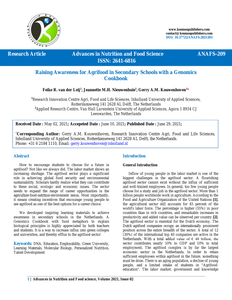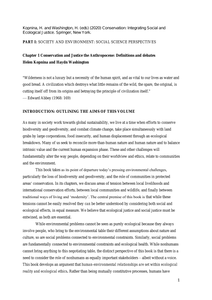This article focuses on engagements with elephants in diverse contexts, inquiring why some scholars are indifferent or even actively opposed to discourses that emphasise elephant suffering. In order to address this question, this article will explore three interrelated streams within social science: one that criticises conservation as an elitist, neo-colonial enterprise; one that is preoccupied with the social construction and cultural interpretation of natural phenomenon; and a third sometimes referred to as the new conservation science that focuses on economic valuations of the benefits nature, viewing “nature is a warehouse for human use.” https://doi.org/10.1080/13880292.2016.1204882 LinkedIn: https://www.linkedin.com/in/helenkopnina/
MULTIFILE

For interspecies justice, animal welfare, and animal rights, the planet needs to be divided on the basis of species' natural resource requirements. The Half-Earth View is that to maintain viable populations of the Earth's remaining species, half of landscapes and seascapes need protection from intensive economic activity. This protection is needed outside the nature preserve system, such as in agricultural areas or cities, so nature can co-exist with local communities. LinkedIn: https://www.linkedin.com/in/helenkopnina/
MULTIFILE

In human-controlled environments, areas of wild plants are 'translated' into cultivated landscapes to accommodate social, cultural and economic needs. This article explores indoor, agricultural and (sub)urban landscape in the Netherlands, focusing on the use of plants both indoors and outdoors, and reveals anthropocentric, instrumental and unsustainable practices. The article also presents suggestions for alternative, more ethical and sustainable ways of relating to plants in the Netherlands and beyond. https://www.ecologicalcitizen.net/article.php?t=wilderness-plastic-plants-how-might-get-back-wildness https://www.linkedin.com/in/helenkopnina/
MULTIFILE

How to encourage students to choose for a future in agrifood? Not like we always did. The labor market shows an increasing shortage. The agrifood sector plays a significant role in achieving global food security and environmental sustainability. Scholars hardly realize what they can contribute to these social, ecologic and economic issues. The sector needs to expand the range of career opportunities in the agriculture-food-nutrition-environment nexus. Most importantly, it means creating incentives that encourage young people to see agrifood as one of the best options for a career choice. We developed inspiring learning materials to achieve awareness in secondary schools in the Netherlands. A Genomics Cookbook with food metaphors to explain biological principles is highly appreciated by both teachers and students. It is a way to increase influx into green colleges and universities, and thereby efflux to the agrifood sector.
MULTIFILE

This article examines how collaborative design practices in higher education are reshaped through postdigital entanglement with generative artificial intelligence (GenAI). We collectively explore how co-design, an inclusive, iterative, and relational approach to educational design and transformation, expands in meaning, practice, and ontology when GenAI is approached as a collaborator. The article brings together 19 authors and three open reviewers to engage with postdigital inquiry, structured in three parts: (1) a review of literature on co-design, GenAI, and postdigital theory; (2) 11 situated contributions from educators, researchers, and designers worldwide, each offering practice-based accounts of co-design with GenAI; and (3) an explorative discussion of implications for higher education designs and futures. Across these sections, we show how GenAI unsettles assumptions of collaboration, knowing, and agency, foregrounding co-design as a site of ongoing material, ethical, and epistemic negotiation. We argue that postdigital co-design with GenAI reframes educational design as a collective practice of imagining, contesting, and shaping futures that extend beyond human knowing.
MULTIFILE
This paper outlines the main differences between ecocentric and anthropocentric positions in regard to justice, exploring university students’ perceptions of the concepts of social and ecological justice and reflecting on how values assigned to humans and the environment are balanced and contested. Putting justice for people before the environment is based on evidence that biological conservation can disadvantage local communities; the idea that the very notion of justice is framed by humans and therefore remains a human issue; and the assumption that humans have a higher value than other species. Putting justice for the environment first assumes that only an ecocentric ethic guarantees protection of all species, including humans, and therefore ecological justice already guarantees social justice. This research shows that many students emphasize the convergence of social and ecological justice where human and environmental interests correspond. While not wishing to diminish the underlying assumptions of either ethical orientation, the common “enemy” of both vulnerable communities and nonhuman nature, as identified by students, is an ideology of economic growth and industrial development. http://dx.doi.org/10.13135/2384-8677/2688 LinkedIn: https://www.linkedin.com/in/helenkopnina/
MULTIFILE

This article aims to supplement the three “golden rules” of rewilding – or three Cs – the Cores, Carnivores, and Corridors – by a fourth C – Compassion, in discussing the case of Oostvaardeplassen in The Netherlands. The cores refer to large, strictly protected ecologically intact areas, carnivores refer to natural predators, and corridors connect passages for fauna movements. We propose a fourth requirement: Compassion. This fourth C would ensure that any active (re)introduction must be in the interests of the individual animals involved. This article briefly explains the history of the Oostvaardeplassen project and leads into a discussion of the scientific (biological requirements of the species, area, and species fit, etc. ) and ethical (animal welfare, ecocentrism, etc.) constraints and opportunities for rewilding. All four Cs, we argue, are absent from Oostvaardeplassen, which can be considered an example of how rewilding should not be undertaken. Against this background, we propose an alternative way forward. https://www.ecos.org.uk/ecos-406-the-golden-rules-of-rewilding-examining-the-case-of-oostvaardersplassen/ LinkedIn: https://www.linkedin.com/in/helenkopnina/
MULTIFILE

As many in society work towards global sustainability, we live at a time when efforts to conserve biodiversity and geodiversity, and combat climate change, take place simultaneously with land grabs by large corporations, food insecurity, and human displacement through an ecological breakdown. Many of us seek to reconcile more-than-human nature and human nature and to balance intrinsic value and the current human expansion phase. These and other challenges will fundamentally alter the way people, depending on their worldview and ethics, relate to communities and the environment. While environmental problems cannot be seen as purely ecological because they always involve people, who bring to the environmental table their different assumptions about nature and culture, so are social problems connected to environmental constraints. Similarly, social problems are fundamentally connected to environmental constraints and ecological health. While nonhumans cannot bring anything to this negotiating table, the distinct perspective of this book is that there is a need to consider the role of nonhumans as equally important stakeholders – albeit without a voice. This book develops an argument that human-environmental relationships are set within ecological reality and ecological ethics. Rather than being mutually constitutive processes, humans have obligate dependence on nature, not vice versa. We argue that over-arching ecological ethics is necessary to underpin conservation in the long-term. This requires a holistic ‘justice’, where both social justice (for humans) and ecological justice (for nature) are entwined. However, given the escalating environmental crisis and major extinction event we face, and given that social justice has been dominant for centuries, we believe that in many cases ecojustice will need to be prioritized. This will depend on the situation, but we feel that under ecological ethics, holistic ethics cannot always allow social justice to dominate, hence there is an urgent need to prioritize ecojustice today. Accordingly, this book will deal with questions of both social and ecological justice, putting forth the idea that justice for both humans and nonhumans and their habitats can only be achieved simultaneously. This book will explore the following questions: What is the relationship between social and ecological justice? How might we integrate social and ecological justice? What are the major barriers to achieving this simultaneous justice? How can these barriers be overcome? What are the major debates in conservation relevant to this? doi: 10.1007/978-3-030-13905-6 LinkedIn: https://www.linkedin.com/in/helenkopnina/
MULTIFILE

There is mounting evidence that efforts to mitigate the adverse effects of human activity on climate and biodiversity have so far been unsuccessful. Explanations for this failure point to a number of factors discussed in this article. While acknowledging cognitive dissonance as a significant contributing factor to continuing unsustainable practices, this article seeks to explore hegemonic rationality of industrial expansion and economic growth and resulting politics of denial. These politics promote the economic rationale for exploitation of the environment, with pursuit of material wealth seen as the most rational goal. Framed this way, this rationality is presented by political and corporate decision-makers as common sense and continuous environmentally destructive behavior is justified under the guise of consumer choices, hampering meaningful action for sustainable change. This article underlines forms of alternative rationality, namely, non-utilitarian and non-hierarchical worldview of environmental and human flourishing, that can advance sustainability. LinkedIn: https://www.linkedin.com/in/helenkopnina/
DOCUMENT

Anthropocentrism is the belief that value is focused on human beings and that all other beings are means to human ends. Related to anthropocentrism, humanism privileges the aim of improvement of human welfare. Humanism has underwritten efforts to expose social injustices and improve the welfare of all human beings. In relation to the environment, post-humanism can be defined by a number of characteristics. First, post-humanism exposes anthropocentrism as an attempt to ignore the behavior in which humans focus on themselves at the expanse of all other species. Second, post-humanism critiques exclusive moral focus on human inequalities in relation to environmental protection, emphasizing that inequality between species should remain within the scope of ethical consideration. Third, post-humanism exposes anthropocentrism as an inadequate basis for environmental action as it criticizes anthropocentrism as ethically wrong as well as pragmatically ineffective. https://onlinelibrary.wiley.com/doi/book/10.1002/9781118924396 LinkedIn: https://www.linkedin.com/in/helenkopnina/
MULTIFILE
